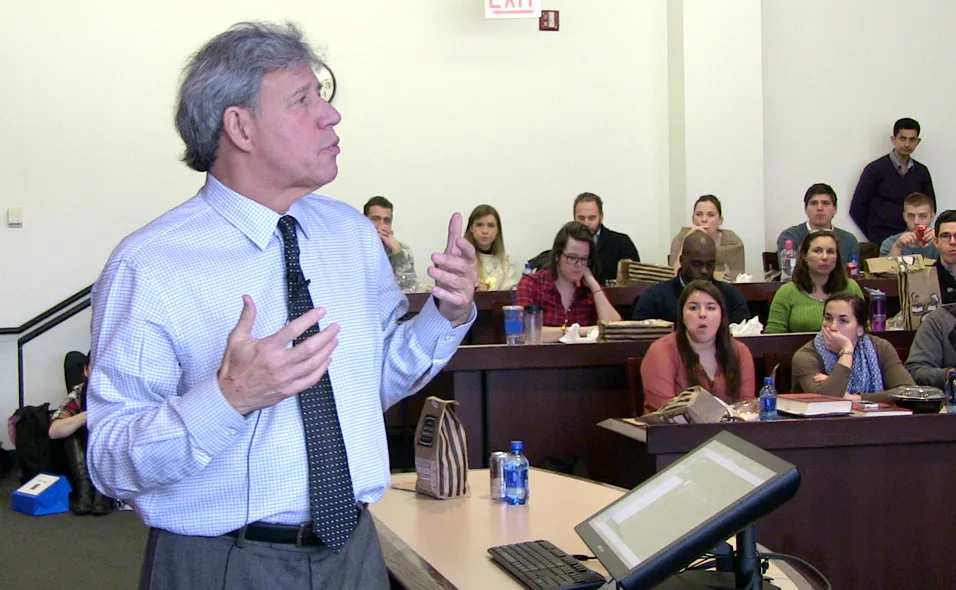Stone Gives Inside Look at NSA Review Group

One day last August, Professor Geoffrey Stone was sitting in his office on the sixth floor of the Law School tower, working on a book, when his phone rang. It was the White House.
Stone was asked to be part of a group of five advisors who would review National Security Agency practices and then provide recommendations to President Barack Obama. Revelations of the NSA’s surveillance of American phone calls had grabbed headlines and inspired public alarm, and Stone is a civil liberties expert and champion.
Stone was very busy and reluctant at first to participate, he told a packed classroom of Law School students during a talk on the experience on February 4. But of course, he explained, you don’t say “no” to the president.
Over the course of five months, the review group conducted an exhaustive examination of NSA practices and prepared a 300-page report with 46 recommendations, most of which the president said he would implement. The panel’s work has been well-documented (including by Stone himself, writing for the Huffington Post), and the report is public, but the Law School community enjoyed the added treat of hearing Stone’s inside account of what it was like to hold top-level meetings and review classified intelligence inside heavily guarded government facilities.
Soon after Stone said “yes” from his office phone, he was sitting in the White House Situation Room with Obama, National Security Advisor Susan Rice, and his former student at the Law School, Lisa Monaco, ‘97, Assistant to the President for Homeland Security. Stone’s fellow advisors on the review group were: Richard Clarke, a security advisor for Presidents Bill Clinton and George W. Bush; Michael Morell, a former deputy director of the CIA; Cass Sunstein, a professor at Harvard Law who taught at the Law School for 27 years; and privacy law expert Peter Swire.
The president explained, Stone said, that he convened the group to review NSA policies in a way that would protect both national security interests and civil liberties and rebuild the public trust.
Ultimately, Stone and his fellow advisors came to unanimous agreement on their recommendations, which Stone said he found very gratifying, considering their different backgrounds and perspectives.
Most of the work, at least at first, was listening, he said. The advisors met with members of Congress, intelligence agency officials, privacy and civil liberties advocates, and members of the Executive Branch, among others.
“A lot of it was learning. Gathering information, and getting perspectives from people who wanted our ear,” he said. Unlike the other four advisors, Stone hadn’t worked in government since he was a law clerk for Justice William J. Brennan, Jr., in 1972 and 1973. His ignorance, he said, became immediately apparent in the pervasive use of acronyms; by the end of the first week, he had compiled a list of 279 to look up.
Much of the information the advisors reviewed was classified, so Stone could only work inside secured government facilities, including an FBI office in Chicago. He couldn’t take any of the work home or to the office, and he spent four or five days a week in Washington.
“It was like being in a cave for five months,” he said, but “it was fascinating. I learned an enormous amount. It was exhausting for all of us.”
Stone talked about three recommendations in particular, and the president’s response. First, the review group recommended that the NSA restructure its program in which it collects logs of American phone calls by storing the phone numbers, called “metadata.” This program, created in the wake of terrorism fears after Sept. 11, allowed the NSA to gather metadata on all American phone calls and store them for five years in a database. The program received widespread attention when it was revealed by NSA contractor Edward Snowden.
Stone and the review group found that the program wasn’t quite as draconian as generally perceived, and that it was targeted to a small number of suspected terrorists. Still, they suggested reforms, including that the government shouldn’t hold the database, the NSA shouldn’t be able to query the database without a court order, and data should not be held for more than two years. The president endorsed the proposed changes.
A second recommendation proposed requiring FBI agents to obtain a court order before issuing National Security Letters requiring third parties to turn over private records (banking, telephone, travel, etc.) on a person of interest. Another of Stone’s former students, FBI Director James Comey ’85, strongly objected to this recommendation, and the president deferred to Comey’s judgment (to Stone’s regret).
The review group also recommended the creation of a new job within the U.S. Foreign Intelligence Surveillance Court, which authorizes surveillance of suspected terrorists, for a privacy and civil rights advocate. Obama accepted that recommendation, but with the compromise that the judges on the court could decide themselves when the advocate would be allowed to intervene.
In the Q&A session at the end of the speech, a student asked Stone what he thought about Snowden, who is in Russia trying to avoid prosecution on espionage charges. Stone said that he had mixed feelings; whistleblowers are important, he said, but Snowden leaked the metadata program without understanding whether or not it was useful as an anti-terrorism tool. (It has not proven to be thus far, Stone added.) Perhaps more importantly, Stone said, Snowden leaked the existence of other programs that have been effective in identifying terrorist activity without compromising the privacy of Americans. He thinks Snowden deserves punishment for leaking that information.
“I don’t want individuals with access to classified information to think it’s OK to decide on their own what’s in the best interest of the American public,” Stone said.
